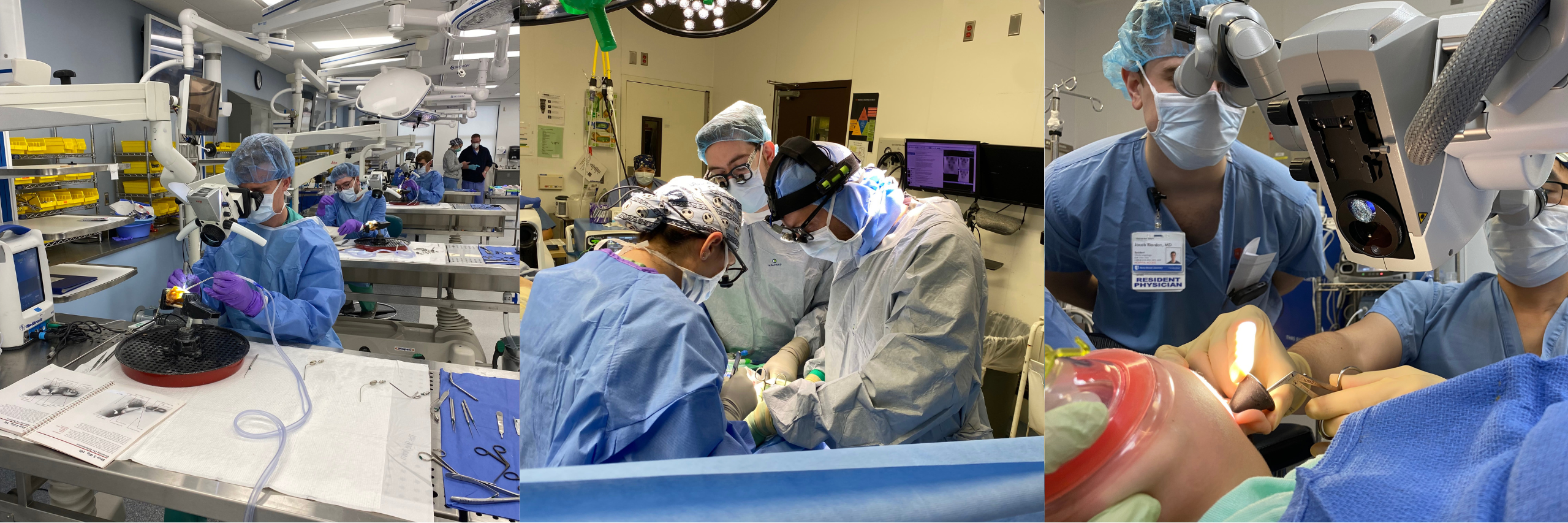How ENT Clinics Provide Expert Allergy and Sinus Care
How ENT Clinics Provide Expert Allergy and Sinus Care
Blog Article
Exploring the Area of Otolaryngology: What to Expect When You Seek Advice From an ENT
Otolaryngology, generally referred to as ENT, encompasses the medical diagnosis and treatment of ear, nose, and throat disorders. For those experiencing related concerns, speaking with an ENT specialist can supply clarity and relief. Understanding what to expect during such examinations is important for efficient communication and treatment. This introduction will outline crucial aspects of the ENT experience, consisting of common reasons for sees and the procedures associated with diagnosis and therapy.

Understanding Otolaryngology: A Summary
Otolaryngology, commonly described as ENT (Nose, throat, and ear) medicine, is a customized branch of medicine that focuses on the diagnosis and treatment of problems influencing these essential locations of the body. This field incorporates a vast array of conditions, including those pertaining to hearing, equilibrium, respiratory system function, and speech. Otolaryngologists are trained to manage both medical and clinical therapies, making use of sophisticated strategies and modern technologies. Their proficiency extends past typical disorders, addressing concerns such as allergic reactions, sinus infections, and hearing loss. Additionally, they play an important role in the administration of head and neck cancers, providing detailed treatment customized to individual patient demands. In general, otolaryngology continues to be crucial for maintaining health and wellness and lifestyle in damaged individuals.
Common Factors to See an ENT Expert
Lots of people look for the competence of an ENT professional for a range of reasons, mirroring the varied nature of problems that impact the nose, throat, and ear. Common issues include chronic sinusitis, which usually results in consistent nasal congestion and face discomfort. Allergies and their connected signs, such as sneezing and itching, also trigger visits to these experts (Sinus). Hearing loss, whether steady or abrupt, is another significant factor for assessment. Additionally, people may look for evaluation for throat disorders, consisting of consistent hoarseness or swallowing problems. Sleep apnea, identified by disturbed breathing during rest, is often addressed by ENT experts. Each of these problems highlights the significance of specialized treatment in handling complex ENT-related health issues
Getting ready for Your ENT Appointment
When preparing for an ENT visit, it is vital to collect pertinent information and think about any kind of certain problems. Patients ought to assemble a thorough case history, including previous ear, nose, or throat issues, surgical procedures, and present drugs. Recording signs and symptoms-- such as severity, regularity, and period-- can provide useful insights for the ENT specialist. In addition, people should prepare a listing of concerns they desire to ask, making certain that all worries are dealt with throughout the see. Bringing along any type of pertinent medical records or test results can even more help the ENT in comprehending the patient's condition. Patients should validate their visit information, including date, time, and place, to reduce any kind of last-minute confusion. Proper preparation can enhance the effectiveness of the assessment and result in better end results.
What to Expect Throughout the Consultation
As the consultation begins, the individual can expect to take part in a detailed discussion with the ENT specialist concerning their symptoms and medical history. The expert will inquire regarding the period, frequency, and extent of signs such as hearing loss, nasal blockage, or aching throat. Furthermore, the client's previous clinical conditions, medications, and any kind of appropriate family background will be reviewed, aiding the expert in forming a complete understanding of the client's health. The ENT might also ask regarding way of life elements, such as direct exposure to irritants or toxic irritants. This open discussion develops a structure for the examination, guaranteeing that the client's problems are dealt with and establishing the phase for any kind of essential evaluations or recommendations for treatment.
Diagnostic Examinations and Treatments in Otolaryngology
A variety of analysis tests and procedures are crucial in otolaryngology to properly evaluate and identify conditions impacting the ear, nose, and throat. Usual tests include audiometry, which measures hearing feature, and tympanometry, evaluating center ear pressure. Nasal endoscopy allows visualization of the nasal passages and sinuses, while laryngoscopy checks out the throat and singing cables. Imaging techniques, such as CT scans and MRIs, give thorough views of head and neck structures. Allergy testing might also be carried out to identify triggers for sinus or respiratory issues. These analysis tools enable ENT experts to establish reference a complete understanding of clients' conditions, making certain customized and effective monitoring plans. Appropriate diagnosis is vital best way to get rid of congestion for effective therapy results in otolaryngology.
Treatment Alternatives Used by ENT Specialists
ENT experts provide a selection of treatment options customized to attend to particular problems impacting the ear, throat, and nose. These treatments range from conservative strategies, such as medication and way of life alterations, to even more invasive procedures. As an example, allergic reactions may be handled with antihistamines or immunotherapy, while persistent sinus problems may require nasal corticosteroids or sinus surgical treatment. For hearing loss, ENT professionals frequently advise listening device or surgical treatments like cochlear implants. In instances of throat conditions, options can include speech treatment or procedures to get rid of blockages. Furthermore, they may offer assistance for handling sleep apnea, consisting of making use of CPAP tools or surgical treatments. Generally, the goal is to boost patients' lifestyle with personalized care and reliable treatment strategies.
When to Look For Follow-Up Care With an ENT
When to seek follow-up treatment with an ENT expert is crucial for managing ongoing signs and symptoms or issues associated to nose, throat, and ear problems, identifying. Patients ought to consider arranging a follow-up appointment if signs persist regardless of preliminary therapy, such as chronic ear discomfort, nasal congestion, or throat discomfort. Changes in hearing, balance issues, or unusual nasal discharge may also necessitate more evaluation. In addition, if a patient experiences adverse effects from recommended medicines or has undergone an operation, follow-up care is necessary to check recuperation and address any type of concerns. Timely appointments can ensure reliable management of problems, avoid possible problems, and supply tranquility of mind pertaining to one's health. Looking for follow-up treatment promotes positive health visit this site administration in otolaryngology.
Frequently Asked Concerns

What Qualifications Should I Try to find in an ENT Professional?
When seeking an ENT professional, one must search for board qualification, pertinent experience, and solid client reviews. Furthermore, efficient communication abilities and a compassionate strategy can significantly improve the total therapy experience.
Just how Do I Select the Right ENT for My Needs?
Picking the best ENT expert includes examining their credentials, experience, and individual reviews (Otolaryngology). It is necessary to contemplate their interaction design and technique to treatment, guaranteeing they line up with the individual's particular wellness needs and choices
Exist Any Type Of Dangers Connected With ENT Procedures?
The risks connected with ENT procedures may include infection, bleeding, anesthetic issues, and potential damage to surrounding frameworks. People must review these threats with their physician to recognize private concerns and guarantee informed decisions.
How Can I Handle Anxiousness Before My ENT Visit?
To take care of stress and anxiety before a consultation, individuals can exercise deep breathing workouts, envision positive end results, prepare questions beforehand, and seek assistance from close friends or household, fostering a sense of peace of mind and peace.
What Should I Do if I Experience Negative Effects From Treatment?
The person should promptly report them to their healthcare provider if side impacts from treatment happen. Changes to treatment or added interventions might be required to ensure safety and security and efficiency in managing their condition - Otorrinolaringologia. As the consultation starts, the person can anticipate to involve in a comprehensive conversation with the ENT specialist about their signs and symptoms and clinical background. These analysis tools enable ENT experts to establish a thorough understanding of patients' conditions, ensuring customized and reliable monitoring strategies. ENT professionals offer a selection of therapy options tailored to deal with details problems affecting the throat, nose, and ear. When seeking an ENT expert, one should look for board qualification, pertinent experience, and solid patient testimonials. Choosing the best ENT specialist includes assessing their certifications, experience, and client reviews
Report this page